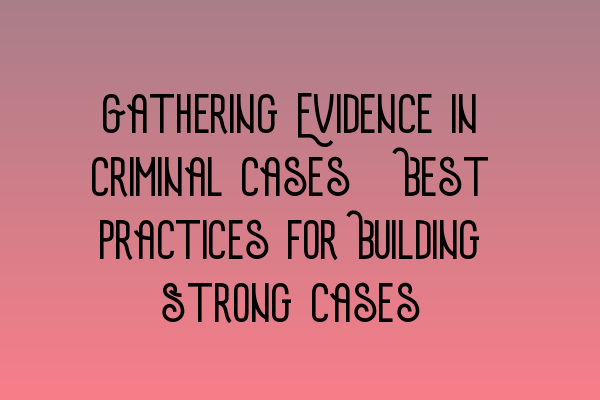Gathering Evidence in Criminal Cases: Best Practices for Building Strong Cases
Introduction
Welcome to SQE Criminal Law & Practice Law UK, where we provide expert legal advice and guidance on various aspects of criminal law. In this blog post, we will focus on the crucial topic of gathering evidence in criminal cases. Building a strong case requires solid evidence, and understanding the best practices can significantly impact the outcome of a criminal trial.
The Importance of Evidence
In criminal cases, evidence plays a central role in proving the guilt or innocence of the accused. A well-gathered and effectively presented evidence can be the key to securing a conviction or successfully defending a client.
There are several types of evidence that can be presented in criminal cases:
- Physical evidence, such as fingerprints, DNA samples, or weapons.
- Documentary evidence, including contracts, records, or financial statements.
- Testimonial evidence, which includes witness statements and expert opinions.
- Circumstantial evidence, which establishes facts indirectly.
Each type of evidence has its own unique value, and a combination of these can significantly strengthen a case.
Best Practices for Gathering Evidence
1. Conduct Thorough Investigations: In criminal cases, thorough investigations are the foundation for gathering strong evidence. It is crucial to review all available information, interview witnesses, and collect any relevant documents or physical evidence.
2. Preserve Chain of Custody: Maintaining the chain of custody is vital to ensure the admissibility of evidence in court. Proper documentation and supervision throughout the process help establish that the evidence has not been tampered with or compromised.
3. Leverage Technology: In today’s digital age, technology can play a significant role in evidence gathering. Utilize advanced forensic tools, surveillance footage, or digital records to strengthen your case.
4. Collaboration with Experts: Consulting experts in various fields, such as forensic scientists, medical professionals, or financial analysts, can provide valuable insights and expert opinions to support your case.
5. Confidential Informants: In some cases, confidential informants can provide valuable information and access to evidence that may otherwise be challenging to obtain. Establishing strong relationships and ensuring proper legal procedures is vital when dealing with confidential informants.
6. Analyze and Organize the Evidence: Once the evidence is gathered, it is essential to meticulously analyze and organize it. Categorize the evidence, create timelines, and prepare summaries to present a clear and coherent narrative during trial.
By following these best practices, legal professionals can ensure a solid foundation of evidence that can stand up in court and significantly impact the outcome of a criminal case.
Conclusion
Gathering evidence is a critical process in building strong criminal cases. The proper collection, preservation, and analysis of evidence can significantly impact the outcome of a trial. By employing best practices, leveraging technology, and collaborating with experts, legal professionals can construct compelling and persuasive arguments to support their clients.
For more information on SQE 1 Practice Exam Questions, SQE 1 Practice Mocks FLK1 FLK2, SQE 2 Preparation Courses, SQE 1 Preparation Courses, and SRA SQE Exam Dates, please visit the respective links.
